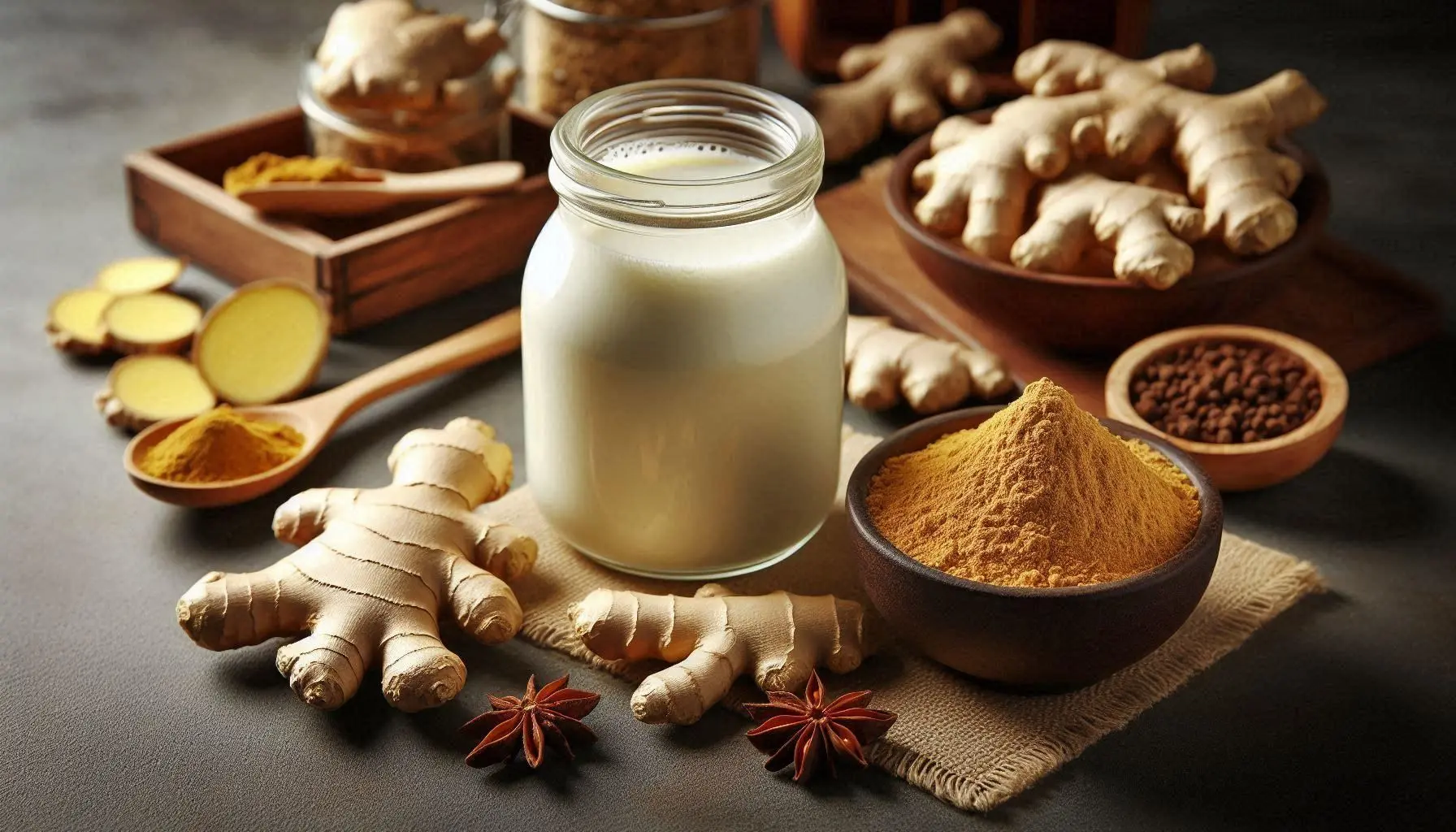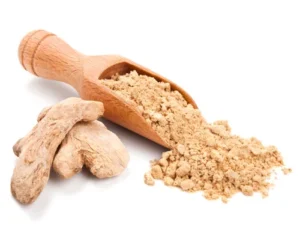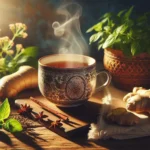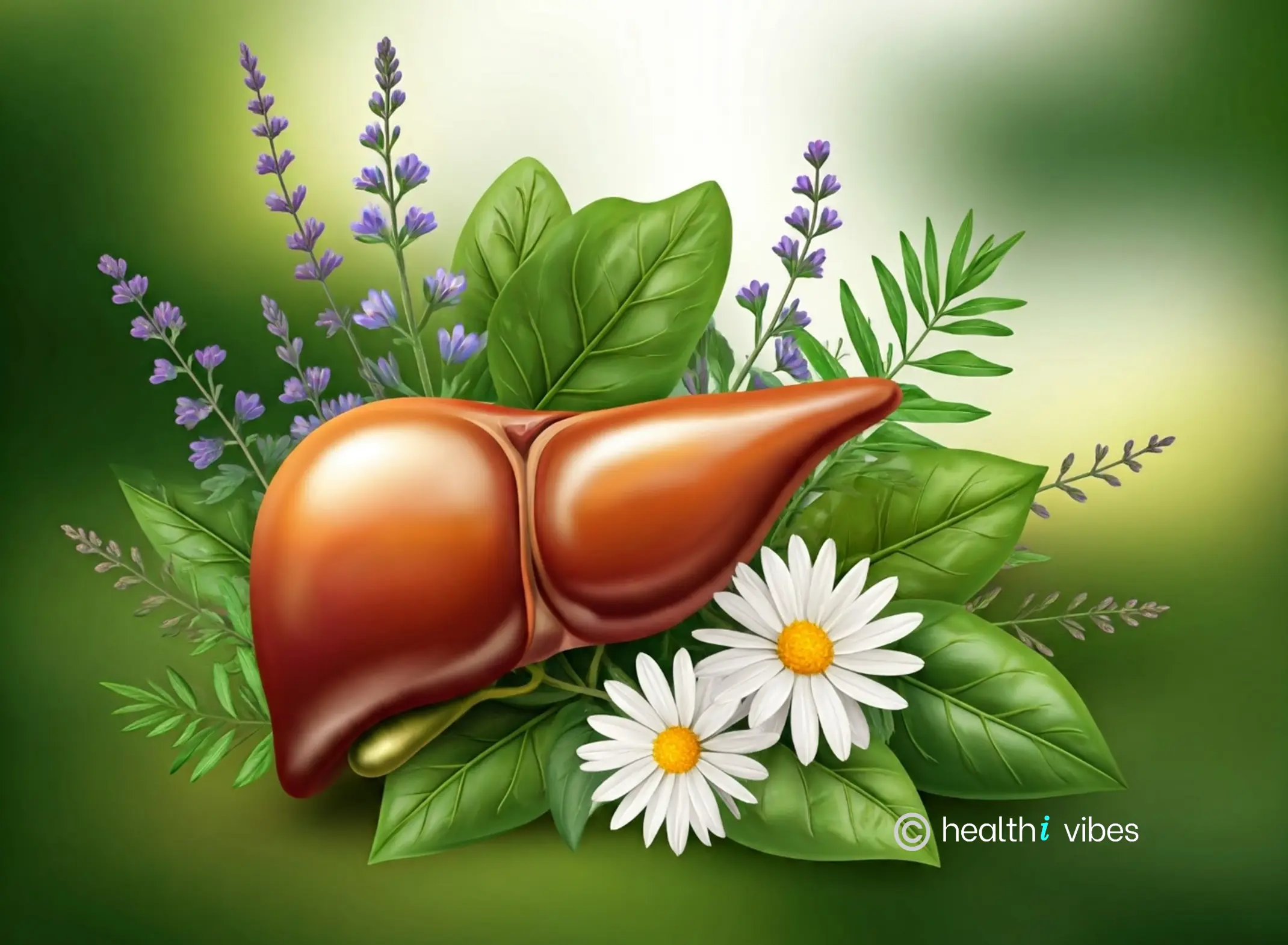Consuming Ginger milk is a easy effective herbal remedy to help body fight cold, cough and respiratory infections.
Ginger, the rhizome of plant Zingiber officinale, is an age old wisdom used in Indian Ayurveda and Chinese traditional medicine dating even before any recorded literature.
History of Ginger
Ginger’s name originates from the ancient Sanskrit word, srngaveram, translating to “horn root.”. Later it gave way to Zingiberi in Greek and to the Latin Zingiber. (Ref) Ginger has been used as medicine from vedic period and is called “maha aushadhi”, means the great medicine. In traditional medicine, it was used as a carminative or antiflatulent. The Greek physician Galen used ginger as a purificant of body. He used ginger to treat conditions caused by imbalances in body
Indians and Chinese are believed to have produced ginger as a tonic root for over 5000 years to treat many ailments, and this plant is now cultivated throughout the humid tropics, with India being the largest producer. (Ref)
Ginger Usage
Ginger is used in numerous forms, including fresh, dried, pickled, preserved, crystallized, candied, and powdered or ground. The concentration of essential oils increases as ginger ages and, therefore, the intended use of the rhizome determines the time when it is harvested. (Ref)
Primary Active Components of Ginger
The nutritional and nutraceutical benefits of ginger are closely associated with the presence of various bioactive compounds. The distinctive aroma flavor of ginger is the resultant blend of three bioactive compounds (gingerol, shogaol, and zingerone), which constitute one to three percent of fresh ginger by weight.
6-Gingerol is the most abundantly available type of gingerol. 6-Gingerol is reported to have different health-beneficial properties like anti-carcinogenic, antioxidant, anti-inflammatory, cardiotonic and hypotensive, anti-emetic, anti-pyretic, anti-rheumatic, anti-ulcer, anti-prostaglandin, and many other properties. (Ref)
6-shogaol is the most amply available and most effective type of shogaol in ginger. 6-Shogaol is also described with many pharmacological and health characteristics like anti-inflammatory, anti-ulcer, anti-prostaglandin, anti-carcinogenic, anti-invasive, and many other properties. 6-Shogaol has a very powerful expectorant or anti-tissue effect, which may assist in reducing blood pressure. (Ref)
What is Dried Ginger?
Dried ginger is obtained when the rhizome is cultivated from the beginning of spring and harvested when the leaves start yellowing and drying. The collected ginger is washed, peeled, cut into small pieces, and dried in sunlight until entirely dehydrated. It is then grounded into a fine powder.
Dried ginger powder, also known as Shunti or Shonth is a primary ingredient in Indian, Chinese, and Tibb-Unani medicines. Dried ginger is highly pungent, very heating, and balances Vata and Kapha doshas. (Ref)
Difference between Fresh and Dried Ginger
While 6-gingerol is the mainly active in fresh ginger, in dried rhizomes, 6-gingerol is dehydrated to 6-shogaol. 6-Shogaol has been demonstrated to exhibit anticancer, antioxidative, and anti-inflammatory actions more effectively than 6-gingerol due to the presence of an electrophilic Michael acceptor moiety. (Ref)
Attributing to this property many comparative studies performed in lab have found 6-Shogaol to be more effective than 6-gingerol in its anticancer (Ref), antioxidative (Ref), and anti-inflammatory effects (Ref).
Benefits of Ginger Milk
Ginger, whether consumed in any form exhibits similar benefits inside body. However some forms are considered to be more effective for certain treatments. Here we discuss the primary benefits of Dried Ginger powder usually consumed with milk, known as “Ginger Milk” to treat cold, cough and respiratory distress.

Ayurvedic Importance
The Chinese have used ginger for at least 2500 years as a digestive aid and anti-nausea remedy and to treat bleeding disorders and rheumatism; it was also used to treat baldness, toothache, snakebite, and respiratory conditions. In Traditional Chinese Medicine, ginger is considered a pungent, dry, warming, yang herb to be used for ailments triggered by cold, damp weather. (Ref)
In Ayurveda, ginger is known as Mahaoushadhi meaning great medicine. Ayurveda recommends ginger for gastric troubles, diaphoretic, antispasmodic, expectorant(to reduce cough), peripheral circulatory stimulant, astringent, appetite stimulant, anti-inflammatory agent, diuretic and digestive aid. (Ref)
Ginger is the major constituent in ayurvedic medicine such as Chatarbhada Kvatha used against fever and respiratory disorders.
Ginger is also a major ingredient in Unani preparations such as ‘Hub-gul-pista’, an expectorant used in treating cold and cough.
In folk medicine, dried ginger milk is consumed at night to increase heat in the body. It is used to treat symptoms of cold and cough.
Antimicrobial Activity:
Ginger and its derivatives have been known for their tremendous anti-bacterial, anti-viral, and anti-fungal activities. A study showed that Ginger is effective in inhibiting Pseudomonas aeruginosa by disturbing the membrane stability and preventing biofilm formation.(Ref) Similarly, other studies have shown its effects on Aspergillus, E coli and many other bacteria. (ref)
Anti-inflammatory Activity:
Multiple studies have mentioned that the anti-inflammatory effect of ginger is beneficial to patients suffering from Asthma and acute respiratory distress syndrome (ARDS). (ref)
Ginger Milk Recipe
Ginger Milk is prepared by boiling small amount of fresh or dried ginger powder with Milk. It can be served with addition of sugar or honey as desired. Additionally, few black seeds can be crushed and added to milk to make it more potent in treating cold and cough.
Dried ginger powder has more heating properties and should be started with smallest amount like a pinch. Too much of dried ginger should not be consumed in warm/tropical areas.
Conclusion
Ginger is one herb which has fascinated the world for over 3000 years. With its myriad effects and high potency , Ginger is an important ingredient in Indian, Chinese and Unani medical formulations.
Although, the quality of many researches is questionable, still the references of traditional medicine places good faith in the use of ginger.
As the scientific community moves to research and understand more about Ginger, why don’t you try this miracle herb yourself to heal you body naturally!
Disclaimer:
The above herbal is a popular herbal drink but still all herbal remedies should be consumed responsibly to avoid overdose. Additionally, you should always consult your physician before starting any herbal treatment on you own.









